
Insights
Meet Queer Women Activists on the Ground in Ukraine
Region(s)
TOPIC(s)
Type
Photo Essay
Author(s)
Publish Date
February 21, 2023
Share
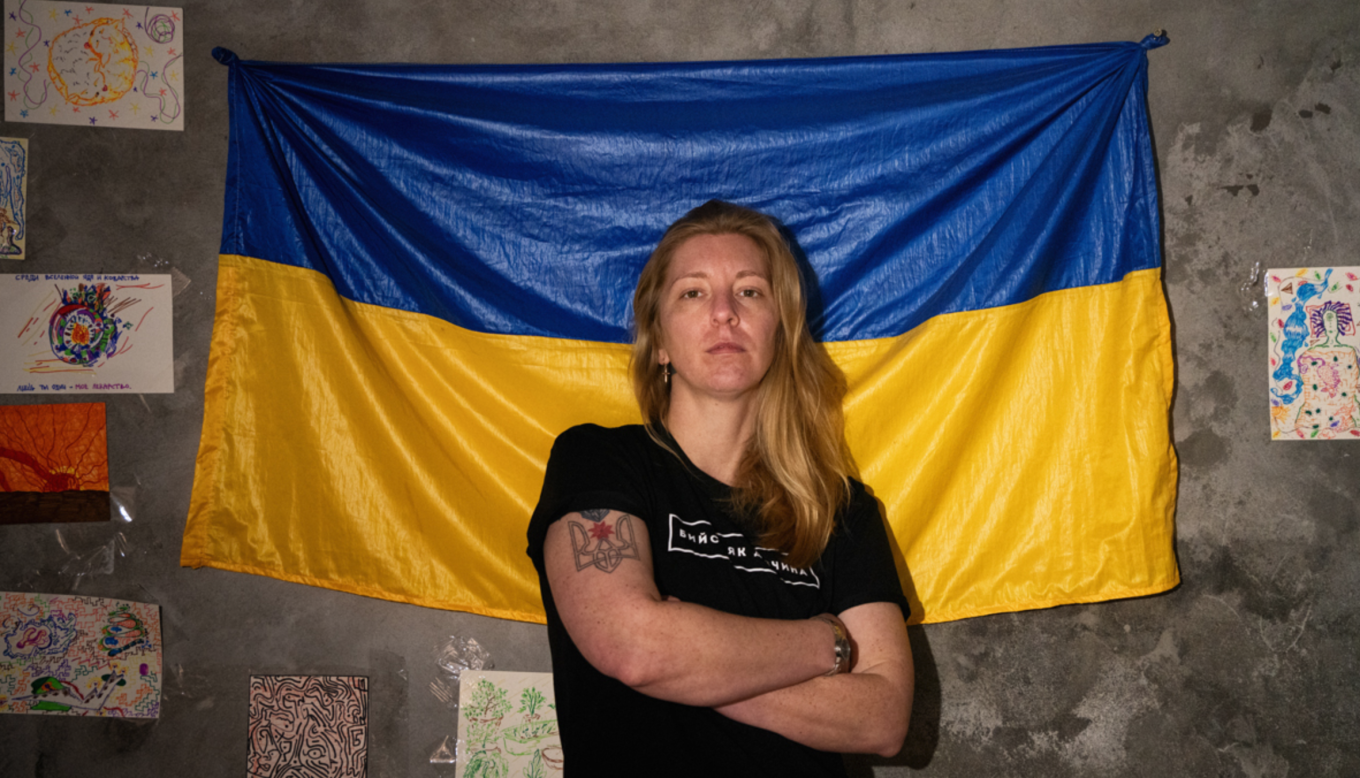
Outright has been working to support Ukrainian activists since Russia launched its full-scale invasion of Ukraine on February 24, 2022. To mark the one-year anniversary of this phase of the war — and ahead of Women’s History Month — Outright International’s LBQ Connect program is sharing the stories of lesbian, bisexual, queer and allied activists who have stepped up to help their communities amidst tremendous challenges.
LBQ women are running shelters, distributing food and medicine, and supporting the fight for Ukraine’s independence and democracy. They are also spreading the word far and wide about the larger stakes that the struggle for Ukraine’s sovereignty has for the country’s queer movement.
Women’s contributions to war efforts and humanitarian assistance have been recognized in conflicts the world over. This may be the first war in which queer women’s leadership has been so visible. Outright is honored to share their stories.
Yevheniia Kvasnevska, Volunteer, Gay Alliance Ukraine/Odesa Pride
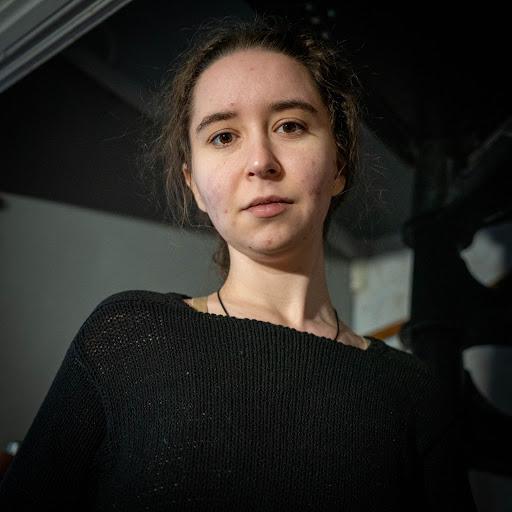
Yevheniia Kvasnevska became an activist at 17, and her reasons were entirely personal.
She had broken up with her girlfriend and was isolated at college, and her search for community led her to discover Gay Alliance Ukraine and Odesa Pride. It was 2015, and Odesa’s city government had just banned a pride march, a decision queer activists fought in court for five years before definitively defeating the order. As that battle worked its way through the courts, they organized annual marches from 2016 onward, always facing resistance from city officials and threats from counter-protestors.
Kvasnevska redoubled her volunteer work after February 24th, preparing to shelter people in Gay Alliance Ukraine’s Odesa office and helping organize food delivery to places closer to the fighting. She feels part of a movement across Ukraine that is called to service.
“So many people are volunteers now because I see that Ukraine is rising up,” Kvasnevska said. “This moment is good to consolidate against our most important enemy, which is Russia…. I don't care who you are, I don't care about your hair color, or about your sexual orientation, or about your religious stuff. Now we are fighting shoulder by shoulder.”
Kvasnevska spent many weeks last summer traveling to Prides around Europe, seizing the opportunity to rally support for Ukraine. At times she felt invisible while speaking at these events, bringing a heavy message to the throngs who were mostly there to party.
“It was so important for me to remind them that when you are here, and you're having your regular lives… the soldiers in Ukraine are dying right now ... not only for their families, not only for this territory, but also for European values, for Europe,” she said. “Ukraine now is fighting for tomorrow, for our peaceful tomorrow.”
Olena Shevchenko, Executive Director, Insight NGO
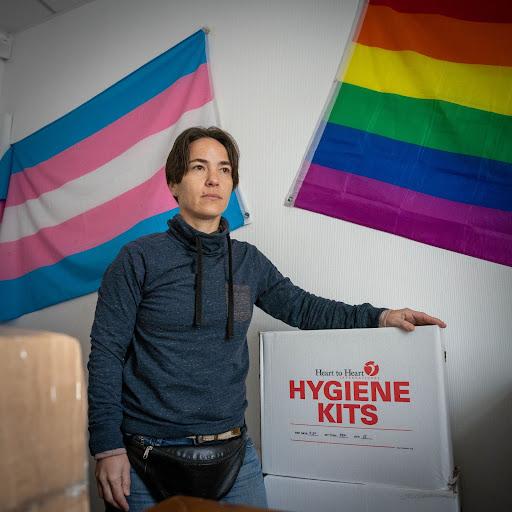
A few days into the war, Olena Shevchenko was questioning her life’s work.
She’d dropped out of a biology PhD program in 2005 to devote herself full time to queer activism. She was a founder of Insight NGO, a feminist LGBTIQ organization that developed a presence in eleven Ukrainian regions. She’d repeatedly faced down homophobic thugs. She was at the Euromaidan protests every day to defend democracy, and organized women’s self-defense workshops to counter fellow protestors who said “the place of women is to support the ‘real heroes.’” Amidst the Euromaidan encampment, she joined a queer rights rally, held so that everyone could see LGBTIQ people were part of the democratic struggle. Participants were beaten and their banners destroyed.
“There was no choice for us at that time,” she said. “It was pretty obvious that we are fighting between two concepts: ‘Russian World’ and ‘European Values.’”
Although progress was slow, in the years following the Revolution of Dignity, the human rights framework helped queer people and women gain ground. The government banned employment discrimination based on sexual orientation, reformed laws allowing transgender people to change their legal gender, and signed onto an international agreement on combatting violence against women.
This felt pointless when bombs started falling near her apartment in Kyiv.
“In the war … my human rights are useless,” she said. “It seems like humanity, [at] this stage of development, still doesn't have any instruments [that] can be used to protect people or countries from such crazy things.”
But she, and Insight, kept going. They opened shelters in three cities to house people displaced by the war, and created a humanitarian distribution hub that sends custom-packed boxes of food, medicine, and hygiene supplies to 200 people every day.
As hard as things are, she said, “The fuel [to keep fighting] is there.”
Olena Hloba, Founder, Tergo
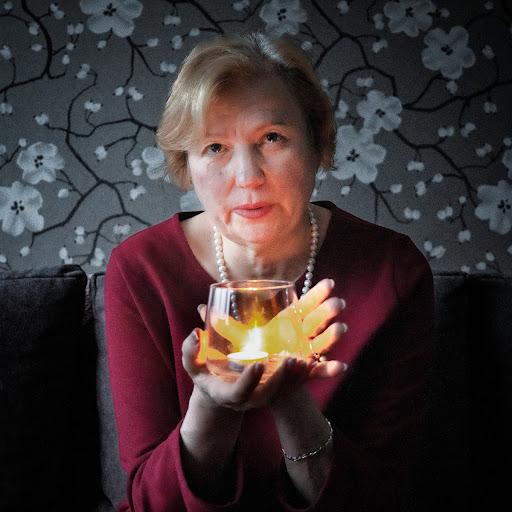
Olena Hloba became an activist because her son asked her to write a letter to the president.
It was 2012, and she was rebuilding her relationship with her son, Bogdan. Olena and her husband had reacted badly when Bogdan first came out in 2003. She’d worried for him as he became an activist and founded one of Ukraine’s major LGBTQ rights groups, Fulcrum.
Bogdan wanted Olena to use her moral authority as a parent to tell the president to reject a proposed “gay propaganda law.” Olena was fearful — she worried she could be fired from her teaching job. But after a gay man was killed in a hate crime at a Kyiv night club, she decided to take the risk. Of all the things she’s written in her life, Olena said, “This letter was one of the best.”
Olena went on to found an organization called Tergo, a network for the parents of LGBT children modeled on the US organization PFLAG.
Olena was living in the Kyiv suburb of Bucha when Russian forces swarmed across Ukraine’s borders on February 24. She saw a Russian tank out her window that evening. She spent a week huddled in the freezing basement before Bogdan convinced her to make a break for it. Olena grabbed a bicycle and pedaled as fast as she could, taking back streets so she wouldn’t be shot by soldiers or robbed of her transportation by other desperate people. Finally, she spotted a checkpoint flying a Ukrainian flag — she’d crossed the front line of fighting. She soon left the country for a time to recover.
Bucha was liberated after five weeks of Russian occupation, becoming well known as the site of some of the war’s worst atrocities. Olena was determined to return home to Bucha and to continue her work with Tergo, which is now pushing for partnership rights for same-sex couples.
“Our LGBT children are soldiers now, and they are also able to fight for their country. Maybe their country owes them something. Maybe their country should give them equal rights with their heterosexual counterparts.”
Anna Leonova, Executive Director, Gay Alliance Ukraine
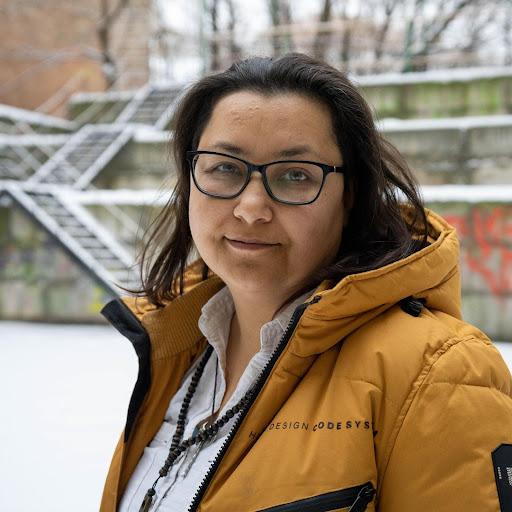
Thousands fled Kyiv when Russia began dropping bombs on 24 February 2022. Anna Leonova, CEO of Gay Alliance Ukraine (GAU), went in the other direction. Away on business, she caught the first train she could get back to the capital. She initially thought she would flee with her partner, dogs, and cats. But instead she stayed. GAU, which has a presence in 16 places across Ukraine, was immediately inundated with requests.
At first, she said, people seemed to have “the need to be in the same space with some other people.” The organization decided to offer food and shelter to LGBTIQ people in need. And while the organization continues to do this work, her thoughts are also on what follows the war.
“I'm very proud of LGBT people who make open statements while serving in the Ukrainian Armed Forces, and those who are open civilian activists… But after our victory, … hatred will remain in our society, and I am scared that LGBT people might become one of the targets for this hatred,” Leonova said. “I'm sure that after the war we will have to rebuild not only our roads and buildings, but we will need to rebuild our civil society."
Anna Zyablikova, Soldier and Security Volunteer, Kyiv Pride and Kharkiv Pride
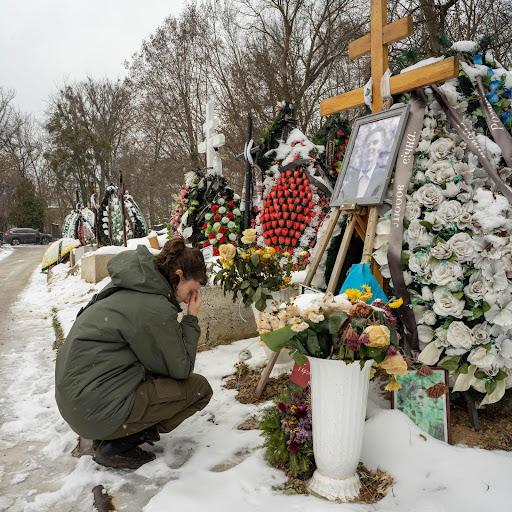
A light snow was falling in December when Anna Zyablikova visited a cemetery in Kyiv.
She was on leave from her battalion, wearing military fatigues and a crest of a unicorn in flames, the insignia of an organization called LGBTQ Military. She had come to pay her respects to a teenage hero of the 2014 pro-democracy revolution, Roman Ratushnyi, who had died recently while fighting Russian forces near Kyiv. He was 22.
Ratushnyi inspired Zyablikova to enter activism and national service. She left graduate studies in biology to join protests in 2014, arriving to work in a makeshift hospital on the day police shot dead 41 protestors. When Russia responded to the revolution by annexing Crimea and starting a war in the eastern Donbas region, Zyablikova joined a collective assisting displaced Ukrainians. A lesbian collective member inspired her to join the queer human rights movement, as well, and she began volunteering to provide security for Pride marches threatened by right-wing groups. Last year she dropped out of graduate school once again — this time to become a soldier.
This war, Zyablikova said, is a “time for us to get closer to the people that were against us.” She has seen this first hand: back in 2019, she struck up a conversation with a stranger on a train and learned he’d been part of a right-wing group that once tried to block Kyiv Pride. “At some point in our lives, we were standing one against another,” she said. But they stayed in touch, and he had made plans to join her military unit.
“I'm already waiting for him as a friend of mine to come,” she said.
Oksana, Coach, Teacher, and Volunteer, Gay Alliance Ukraine
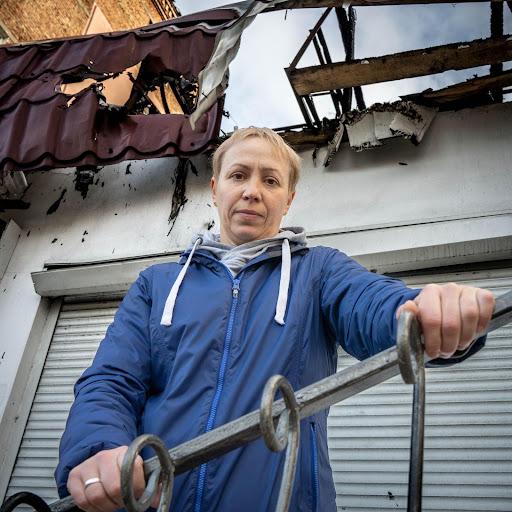
Oksana’s world shattered as she crossed the length of Ukraine on an overnight train.
Late February 2022 took Oksana to Sumy, a city just an hour from Ukraine’s northeastern border with Russia, where she was coaching a track and field tournament. She boarded an overnight train home to Mykolaiv with her team on February 23, and they were shaken awake by their buzzing cell phones as the first Russian bombs began falling around 5am on the 24th. The windows of Mykolaiv’s main train station were already shattered, and the military airfield nearby was in flames.
Even though Mykolaiv endured months of heavy fighting — it was the firewall preventing Russian forces from reaching Odesa — Oksana never thought of leaving. She was responsible for a disabled sister and a father who’d had a stroke. She was also a special education teacher, and she didn’t want to abandon her students, even after the windows of her school were blown out.
When the bombs fell, she hid in her basement along with a menagerie of pets.
“I would grab my dogs under my arms, put the cat in its bag, and the parrot in a three-liter jar, and take all of them with me,” she said. “Only the fishes stayed home.”
Oksana had never been an activist, but when a friend in Odesa asked if she’d set up a humanitarian hub in the city with Gay Alliance Ukraine, she jumped at the chance.
“I always find some way to help people,” she said.
Olha Poliakova, Executive Director, Gender Stream
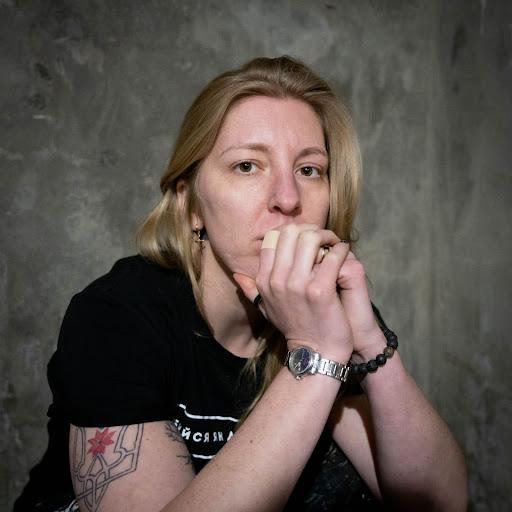
The small basement had bare cinder block walls and a single naked lightbulb.
The small basement had bare cinder block walls and a single naked lightbulb. But it would have to serve as a kitchen, bomb shelter, and town hall for more than 20 people in this shelter for queer people on Ukraine’s western border, the only space in the building where the floors were not reserved for sleeping. Olha Poliakova decorated it with a Ukrainian flag she was given in 2015, when she was helping repel Russian-backed forces from Mariupol during the Kremlin’s first attempt to seize the Donbas.
She suffered PTSD for years after, and she didn’t want to be in a warzone again. So as soon as she heard Russian bombs falling around her home in Dnipro on February 24, she summoned members of her organization, Gender Stream, and began a four-day drive to one of Ukraine’s westernmost cities. There she discovered a crisis: dozens of queer people, especially trans people, were also trying to get to safety, but those with male identity documents were stuck. President Volodymyr Zelenskyy had ordered all men 18-60 to stay in the country so they could be available for the military draft. Military policy provided for an exemption for “transsexualism,” but this required a diagnosis by a psychiatrist, which was nearly impossible to access.
For Poliakova, assisting vulnerable people unprepared for war waa patriotic duty just like supporting the war effort. Her organization took on the difficult task of helping people cross the border, ultimately assisting more than 90 trans people cross. Gender Stream bought a house inside Ukraine to use as long-term shelter for those who could not get out, and set up shelters inside the EU to ease the transition into exile.
“We don’t want people with no military experience — whether they’re queer or straight — being turned into cannon fodder,” Poliakova said.
Anna Redko, Human Rights Coordinator, Gender Stream
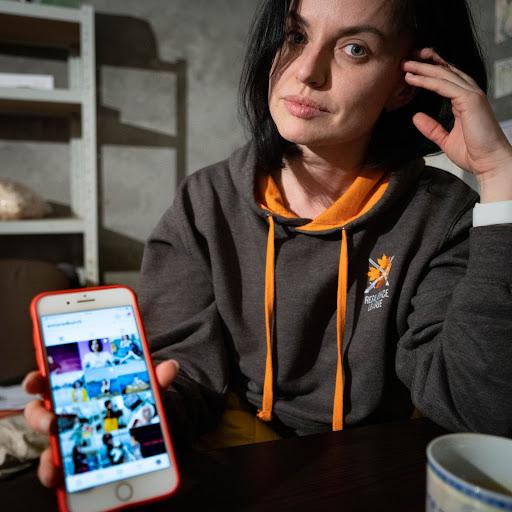
Anna Redko was a TV anchor in Zaporizhzha before the full-scale invasion, “a little star” in her city. Her Instagram from peace time shows her in exotic locations or styled for TV appearances.
That now feels like another lifetime. In the war’s early days, Redko traveled to the far western region of Transcarpathia, where she volunteered at a shelter where Gender Stream was helping LGBTQ people leave the country. She worked with some of the hardest cases, people with male documents who were subject to the draft, but were seeking an exemption for their health.
She felt the urge to fight herself — she asked friends to teach her how to shoot — but she came to believe there were other ways to support the war effort behind the front lines.
“We are the back of this front,” Redko said. The vulnerable need support in wartime too. “I think that all of us now have to do what they can do in the best way…. I know that I can help a lot of people.”
The solidarity she’s witnessed during the fighting has made her heart swell. “I have never been so proud to be Ukrainian,” she said. “I have never been so in love with my country and with my homeland.”
Svitlana Hontar and Nadiia Molozhava
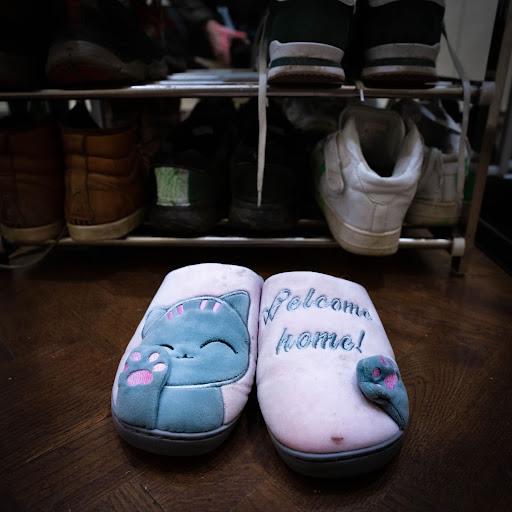
When Russian bombs started falling in Kharkiv, Svitlana Hontar had a plan.
Kharkiv is just 15 miles from the Russian border, and she didn’t want to endure occupation if the city fell. Her partner, Nadiia Molozhava, had survived that once already, spending several months in Donetsk after it was taken by Russian-backed forces in 2014.
Plus, Hontar said, “I didn't want to find myself under Russian occupation because I realized that, being a woman, I would be raped and beaten. And being a lesbian is an aggravating factor, so they would start trying to fix me and make me not a lesbian…. I was really afraid of this.”
They headed for Kyiv, where Hontar planned to join the Territorial Defense Forces defending the capital. But the roads were blocked, and the journey took a long time. Sheltering with strangers posed particular risks for a lesbian couple. One religious woman who hosted them for a night, Hontar recalled, “said that the reasons for the war in Ukraine were the existence of LGBT people and women getting abortions.”
When they finally reachedKyiv, the couple found a home at the shelter run by the queer organization Kyiv Pride. Molozhava was hired as the shelter’s administrator. For both women, living in a queer environment has been a revelation.
“Here we don't have to hide ourselves, we can freely say who we are,” Hontar said. “We are all traumatized, and we can all share this experience, and everyone knows that no one would be judged here.”
A symbol of their new freedom, Molozhava gave Hontar slippers embroidered with the words, “Welcome home.”
Hontar has registered for the military and is waiting to be called up. “We are fighting and doing everything we can for our country, we are doing this for everyone, whether they are LGBT people or not, including this lady who said I was to blame because I am a lesbian,” she said. “I am also working for our victory and for her.”
But she worries what will happen if she’s injured or killed.
“Nadiia, my partner, will not be able to sign the consent for surgery. Or if I die, Nadia won't be able to bury my body according to my wishes,” she said. “We need the same rights as a regular wife and husband…. During the war the need is even more urgent.”

Take Action
When you support our research, you support a growing global movement and celebrate LGBTIQ lives everywhere.
Donate Now